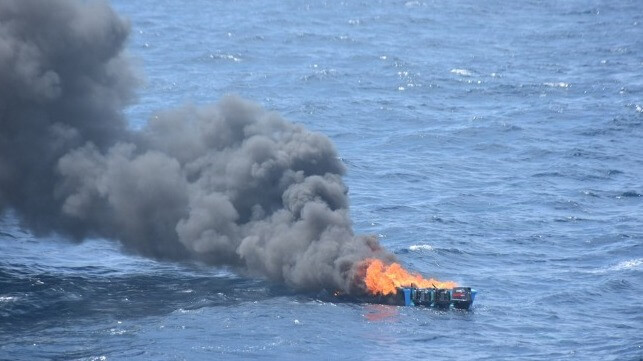U.S. Coast Guard Sees No Drop in Cocaine Boat Traffic After Lethal Strikes

The drone strikes on drug smuggling boats have not been holding back the Coast Guard's performance in daily cocaine seizures, according to a top commander for the region. If anything, the numbers have been going up, as demonstrated by the new record set by USCGC Stone's crew over the least few months. The volumes captured are better than ever; if smugglers are deterred by the threat of lethal strike, it hasn't yet affected boat traffic.
"The drugs you see here on [USCGC] Stone — most have been seized in September, October and even early in the month of November" - all after the start of the drone strike campaign, Coast Guard Atlantic Area Commander Adm. Nathan Moore told CBS. "So business is good for us and we are continuing to enjoy success."
The U.S. Drug Enforcement Agency sees a different view. Whether because of the lethal strikes or the increased Coast Guard seizures, drug prices in Central American and Caribbean transshipment areas are on the rise, DEA Administrator Terry Cole told the network. In this region, where smuggling boats land and offload drugs for onward transport to the U.S. or to Europe, cocaine prices are going up, he said. Cole explained that smugglers are having to pay more for crewmember wages, boats and engines due to the intercepts, and have to increase prices accordingly.
Concerns remain about the legality of the lethal strikes, and reports of isolated objections within the military command structure continue to percolate out. Multiple senior officials, including U.S. Southern Command's top officer, have announced their departure since the start of the campaign. NBC reports that the top lawyer for U.S. Southern Command, Marine Col. Paul Meagher, previously warned commanders that the boat strikes would amount to unlawful extrajudicial killings, potentially exposing U.S. servicemembers to prosecution. If as reported, this opinion would align with the views of the UN High Commissioner for Human Rights, who warned in October that the operation was equivalent to "extrajudicial killing of people aboard these boats."
"Based on the very sparse information provided publicly by the US authorities, none of the individuals on the targeted boats appeared to pose an imminent threat to the lives of others or otherwise justified the use of lethal armed force against them under international law," High Commissioner Volker Turk said.
The Trump administration believes that the individuals aboard the boats are "narco-terrorists" and may be killed without trial in international waters. But the Coast Guard continues to arrest live suspects in the manner of a law enforcement agency, creating two outcomes for smugglers: elimination if intercepted by the U.S. Air Force, or detention if intercepted by the U.S. Coast Guard. DEA director Cole suggested that the two approaches are compatible.
"We're going to apply every single tool to stop the narcotics from coming into the United States and killing American citizens," Cole told CBS.
